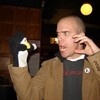
Advertisement
My friends who would normally have more political savvy and critical insight were congratulating Coca-Cola for the ad, which seemed somewhat ridiculous to me until the insane white rage started flying. Then I realized that it actually might have mattered that 60 seconds of air time during America’s most widely shared holiday recognized Muslims as human beings and full citizens. I don’t attribute this to some inner benevolence on the part of Coca-Cola—common sense suggests that not only do they want everyone on the planet to buy their drink, but they also want their customers to believe that they like them and value their happiness. This is a business lesson that World Wrestling Entertainment has forgotten.CM Punk (who happens to have a big Pepsi tattoo on his left shoulder) has left the WWE for a number of speculated reasons that mostly amount to unhappiness with WWE’s creative vision and his own place in it. His abrupt walk-out took place following the disastrous Royal Rumble, during which the crowd favorite, Daniel Bryan, was excluded from the main event, which was ultimately won by Dave Batista. Punk himself lasted almost the entire match, only to be eliminated by Kane in what appeared to be setting up the fourth or fifth-most important match at this year’s WrestleMania. The Royal Rumble showed fans that their emotional investments in Daniel Bryan and CM Punk meant little to the WWE, which was more interested in the middle-aged bodybuilders/movie stars whose appeal might reach beyond regular supporters of the product. (Incidentally, it was at the previous year’s Royal Rumble that CM Punk lost his championship to Dwayne “the Rock” Johnson.) Throughout the Royal Rumble, fans were chanting for Daniel Bryan and bored with nearly everything else. For WWE to follow this up with the loss of CM Punk makes for a bad week. Last night on Raw, the fans were chanting Punk’s name at multiple points of the show, while WWE’s production team scrambled to reduce the crowd noise for the live broadcast. There are even allegations that fans were ejected from the arena for their pro-Punk chants, though this has been denied by the WWE.In the weeks to come, WWE will host matches in cities with the most notoriously hardcore wrestling crowds—including Chicago, the hometown of CM Punk. At this point, the most compelling aspect of Raw is watching fans reject the product and hijack the show with chants that undermine WWE’s narratives. The current level of fan disapproval goes way beyond “Damn, the bad guy won.” Randy Orton isn’t booed for being such a dastardly villain, though he has attempted to redirect the Daniel Bryan love into heel heat for himself; the boos are aimed at the creative team backstage.This makes for a strange time to be a wrestling fan. Two months away from WrestleMania XXX and less than a month from the launch of the WWE Network, WWE has chosen to wage an obstinate battle of wills against its customers. Some of us maintain hope that WWE, which seems to grudgingly accept that Daniel Bryan is far and away its most appealing character, can repair the damage. Perhaps the WWE can plot a new trajectory that will make this controversy appear to have been their plan all along. Unfortunately, the handling of Daniel Bryan thus far suggests that WWE has completely misread the accident of Daniel Bryan’s ascent and assumed that they could easily redirect fan attention away from him. There’s also hope that this whole CM Punk mess is just an elaborate storyline in which real-life locker room gossip has been woven into the scripted drama. At times, pro wrestlers have done metafiction better than anyone, and the company’s real-life owners also appear on camera to play fictional versions of themselves. Unfortunately, however, all indications point to CM Punk's having legitimately walked out on WWE. The company will have to write around him.The point that WWE can learn from Coca-Cola is this: You don’t have to actually like or respect your customers, but you have to pretend you do. A little bit of pretending goes a long way. People that I know who would condemn Coca-Cola any other day of the week for its relationship to Israel were nearly crying with joy over the inclusion of Muslims in that Super Bowl ad. WWE, it’s that simple. We’re the marks, remember? We’ll guzzle down your fattening and fizzy syrup water. Just make it sweet.Michael Muhammad Knight (@MM_Knight) is the author of nine books, including Tripping with Allah: Islam, Drugs, and Writing. His tenth book, Why I am a Salafi, is forthcoming.
